Assassin's Creed Unity: Is it actually good?
For whatever reason, I was thinking a fair bit about Assassin's Creed Unity over the summer. I remember not enjoying the game, like many other people at its release, and it has largely escaped my memory. But I have started to wonder why it missed the mark so resoundingly for me. I recall bugs, several of them game breaking, and a lacklustre character driving a lacklustre plot, but when I think about the mechanics and the playstyle of the game, I can only really think of good things and interesting advances on my favourite AC game of all time, Black Flag. Revamped gear, allowing high levels of customisation and a mix of playstyles, a skill tree, really open-ended assassination missions, a really interesting world to play around in. Did none of these things tip the balance in Unity's favour for me?
I couldn't decide if they could, so I decided to explore it some more. I decided to play through the whole game again and see how it went, trying to keep a clear head and not dwell on the negatives, but come up with a balanced and measured response to a game that, on paper, looks exceptionally good. And when I say whole game, I mean it: I have 100% completed the game and its DLC. This - apparently rather long - blog post details my (not particularly) objective findings.
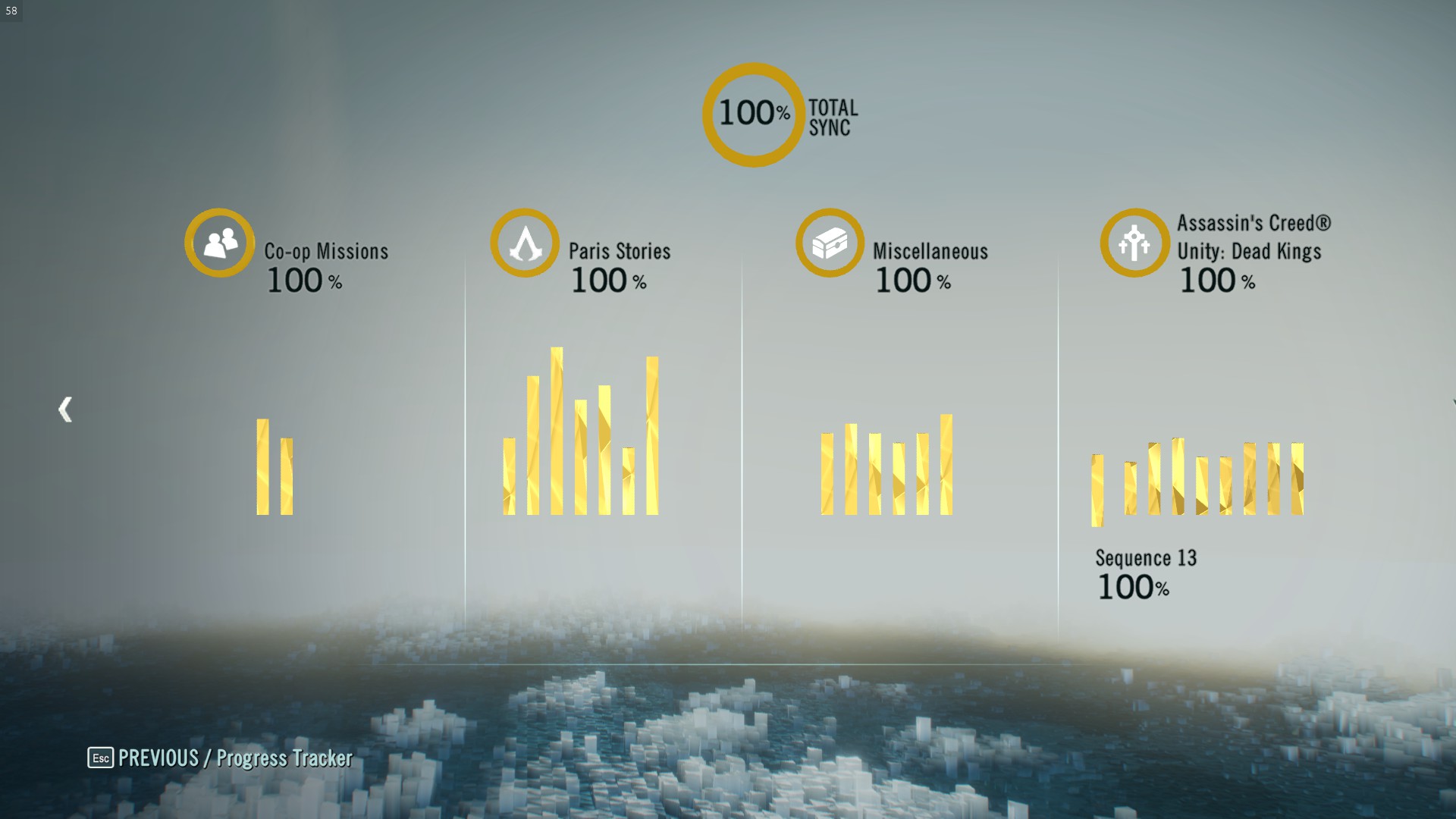
100%. Here's the proof!
It didn't start well for Unity, because my first hurdle was the discovery that the game doesn't have built-in functionality for starting new games. The official Ubisoft guidelines are, astonishingly, to:
- navigate to the Uplay settings,
- turn off cloud saving,
- navigate through my file structure to the Uplay launcher savegame directory,
- locate the ambiguous number associated with Assassin's Creed Unity,
- delete the save file
- and restart the game.
Now look. I really did intend on approaching this with an open heart and mind but I was immediately peeved by this. I'm not opposed to a little bit of man-handling to get a game to do what you want - particularly as I often like to go back and play old games which simply don't work out of the box anymore - as long as it's not outside the ordinary. But starting a new save file really shouldn't be hard. I had never realised how unfriendly this game is for families, or flatmates, who want to share or inherit games - speaking from experience, that makes up a large proportion of gamers. I wonder how many other games of the same period I have breezed past without even considering how difficult they may be for people, not so different to myself, to use?
Another - albeit petty - gripe about this save system is that the Uplay Launcher is typically installed in the Program Files directory, and thus so are the savegames. Usually Program Files aren't covered by backup tools because there is an expectation that if you encountered a situation when you needed to use your backups, you can just reinstall your programs without losing any personal data, so only files in the more user-accessed directories are restored - that's where games should be saved. This is why the My Documents folder is often cluttered with all kinds of save files, particularly in older games. Don't worry though: Uplay has you covered with the aforementioned cloud save system that many games employ.
This system is also not without its issues though - many different voices online suggest turning it off entirely due to how unreliable and potentially damaging it is. I wondered why I had never done this myself, recalling that I had never really had any problems with cloud saving. But then I did remember something: about five years ago, I was playing a Uplay game that set my content back to the start of the game because of a save file corruption which occurred when trying to sync to the cloud. I was furious, like many other players at the time who chimed with my frantic Googling, and just had to swallow it and start the game again. In a twist of fate that I couldn't make up, I now remember that the game in question was none other than Assassin's Creed Unity. How cruel lady fate is.
Regardless of the past and the interesting guidance provided, deleting the save file wasn't as easy as Ubisoft support seemed to make out. I was instructed to look for a folder named 720. It didn't exist in my file structure. I was met instead by eight other numbers, each containing a variable number of savegames, which were all of the ambiguous .SAVE format and completely impenetrable. I went through each of these numbers and moved all the save files to a separate location, acutely aware of the mortality of my lvl 90, top mercenary, all-Anigmata-Ostraka-completed Kassandra, now unprotected by the switched off cloud sync procedure (which, I should add, cannot be disabled for a single game, but must be disabled for all of them). None of them made a difference, and my 70% Unity save was sitting smirking at me every time I reentered the game to check (eight times. Did you know that Assassin's Creed: Unity was designed, developed and produced by a multicultural team of various religious faiths and beliefs? It's been seared into my brain!)
I found the directory eventually, in my C drive, a place I would not have ever asked Uplay to install its launcher. I'll need to investigate that - it appears that I have two launchers installed on my machine despite some very explicit instructions otherwise. I suspect updates with rigidly coded install paths may be the cause, but I'm not sure. Whatever it may have been, finally I was able to watch through the logos and be catapulted straight into the first cinematic. And so it begins.

After a good hour of tinkering, I was finally able to start my game properly.
First of all, Revolutionary Paris really is an amazing setting for an Assassin's Creed game. It has enough verticality to focus on big climbs and enough conflict to allow for some of the more outlandish setpieces. The city is wonderfully realised, with well stylised buildings, locales and features introducing unique atmosphere and character to the different areas of Paris. Unity was also the first game to properly go all-in for indoor settings, with many houses providing routes through or quick paths up to higher levels through their interiors. However, Paris does suffer from an awful lot of clutter. This is clearly by design, and it really accentuates the chaotic atmosphere perpetuated by the crowds of malcontents flooding the streets. Unfortunately, much of the clutter feels like it has not been properly built into the game, but rather thrown in carelessly: Arno constantly gets stuck on it, struggles to compute what level he is on and in general seems to clash with anything that isn't arranged in a very particular - read: traversable - shape.
If the game is to be believed, holding down one of the freerun buttons when running towards an obstacle will instruct Arno to acrobatically slide over or under it. In practice, this happens very occasionally, when you approach at the perfect speed and angle; every other time Arno will clumsily climb onto it or freeze in place, frustratingly slowing down a freerun to a standstill in both cases. This frustration is further accentuated by the horribly under-developed cover system that has been introduced. Only some cover is "coverable" (i.e. can be snapped-behind in the cover system) and the quick-change options advertised in the tutorials are rarely available. Most times, changing cover involves unhooking from one table, barricade or chest-high wall and creeping along to another, only to fumble against it for a few seconds before realising that actually this one isn't "coverable". And although there is a suggestion of a swap-cover mechanic, there is no evidence to suggest that the developers even thought about a mechanic allowing Arno to go around corners in cover, meaning you're just as well ignoring the mechanic entirely for all its use. So the setting is wonderful, just not to play in.
Something else ruins the lovely aesthetic, though. As you run (or even walk) through the streets of Paris, certain graphical and NPC AI elements struggle to settle. You can almost always see a few feet ahead, the outfits of civilians popping in and out, changing, flickering away like a faulty fluorescent bulb. They also walk around with some very strange physics, some apparently climbing onto their compatriots and snapping above the crowd for a second or two. NPCs walking towards boxes or carts in the street don't have climbing animation and instead will simply appear above the ground as they elevate themselves. And all the while, textures in the distance broil and flicker as they try to load. For an experience that is so well crafted when it manages to be, these artefacts break the immersion quite resoundingly, which is a real shame.
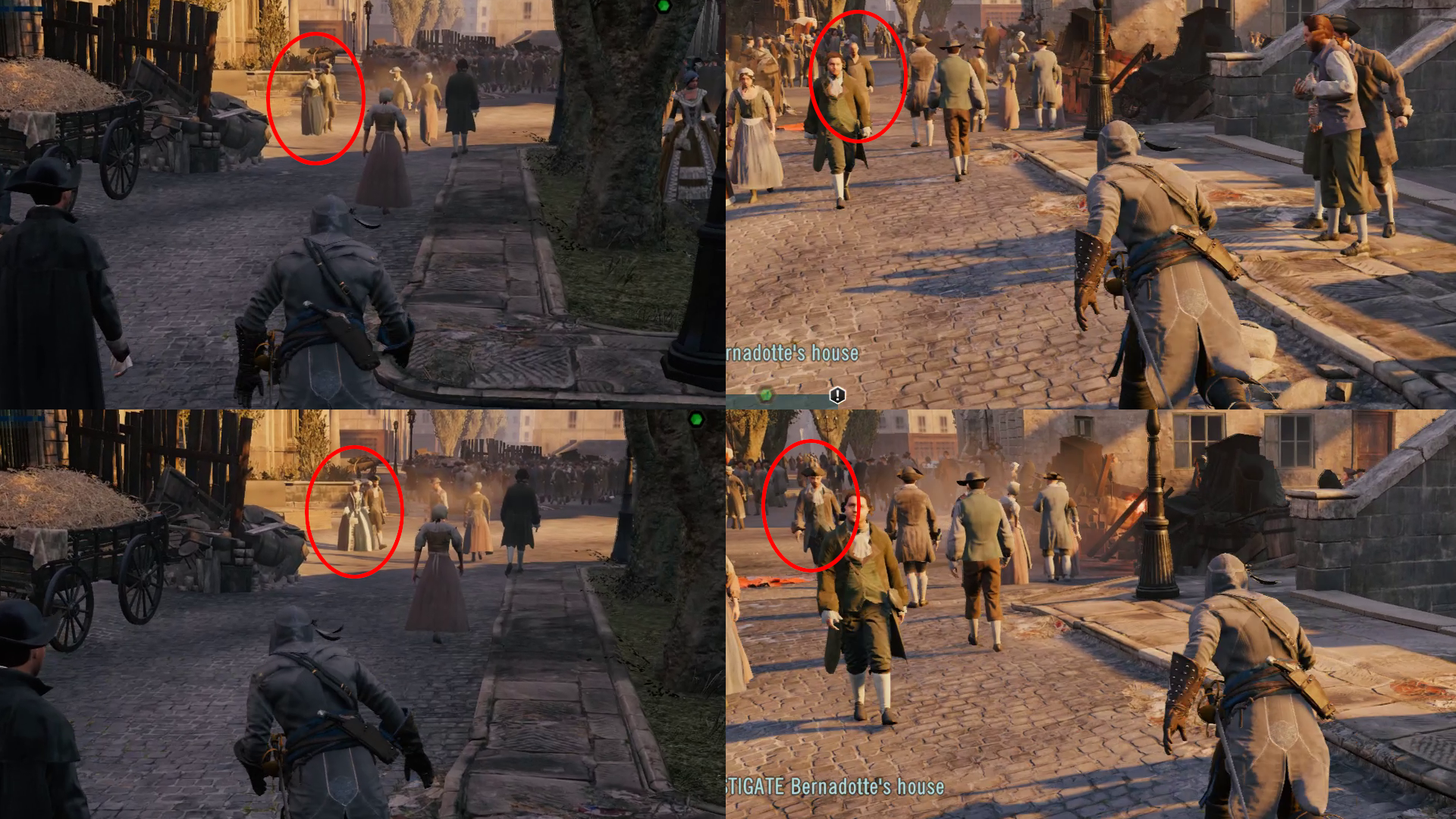
Exhibit A: notice the changing outfits of the NPCs up ahead as the higher detailed textures pop in. It may seem inconsequential, but is quite distracting when it happens so frequently.
It's quite clear to me that Arno was intended to be the next Ezio: he's charismatic, arrogant and cocky, but he really lacks Ezio's charm. In fact, Arno has something of a mean streak which exposes itself in the way that he treats people, particularly those he considers lower than himself, and his troublemaking strikes me as cruel. For example, recall Ezio's conflict at the start of Assassin's Creed 2: a fist fight against a rival family, with both being noble and wealthy with low stakes in the conflict. Arno's opening caper? Stealing from a pair of commoners who had beaten him at cards, culminating in Arno slicing them up with a sword. The game appears to try to detract attention from this by emphasising that he was stealing back his father's pocket watch, an object which is very important to him; something he had conveniently forgotten when he was drunk and short of money. I appreciate that he's not being painted as a flawless hero, but neither was Ezio, and somehow that was achieved ten years ago without the need for him to maim people he had stolen from or insult the help.
Arno is also incredibly petulant. When he's finally given a modicum of responsibility by the brotherhood, every comment is barbed and snarky; not in an endearing, caddish way, but in a moody, argumentative way. His tone of voice sounds like the child who's about to be sent out of the classroom, or has been told to stop pulling his sister's hair. It's unbecoming and frustrating to see in a protagonist, and genuinely does detract from the experience during cutscenes. "Pisspot" is a title styled by one of the other characters, and it's accurate. He is just not a fun person to be around.
Another petty gripe I'm afraid, but the accents in this game are truly awful. It was a bad idea to try and blend stuffy English accents with background French in the first place, but this is compounded by many of the voice actors being Canadians putting on English accents, which I found very jarring. Elise is particularly bad - don't get me wrong, I thought that she was probably the best performed character in the game, but it was so difficult to overlook the odd pronunciations peppered throughout the dialogue. I fundamentally struggle to see what it achieves. Assassin's Creed games before and since have managed to produce English dialogue with accents to match the location: Italy, Constantinople, Egypt, Greece; unbelievably, even French accents were used for the main characters of Assassin's Creed: Liberation! Perhaps this change in vision was to test the waters and see if fans appreciated the shift. Clearly we didn't, because it's never been done again!
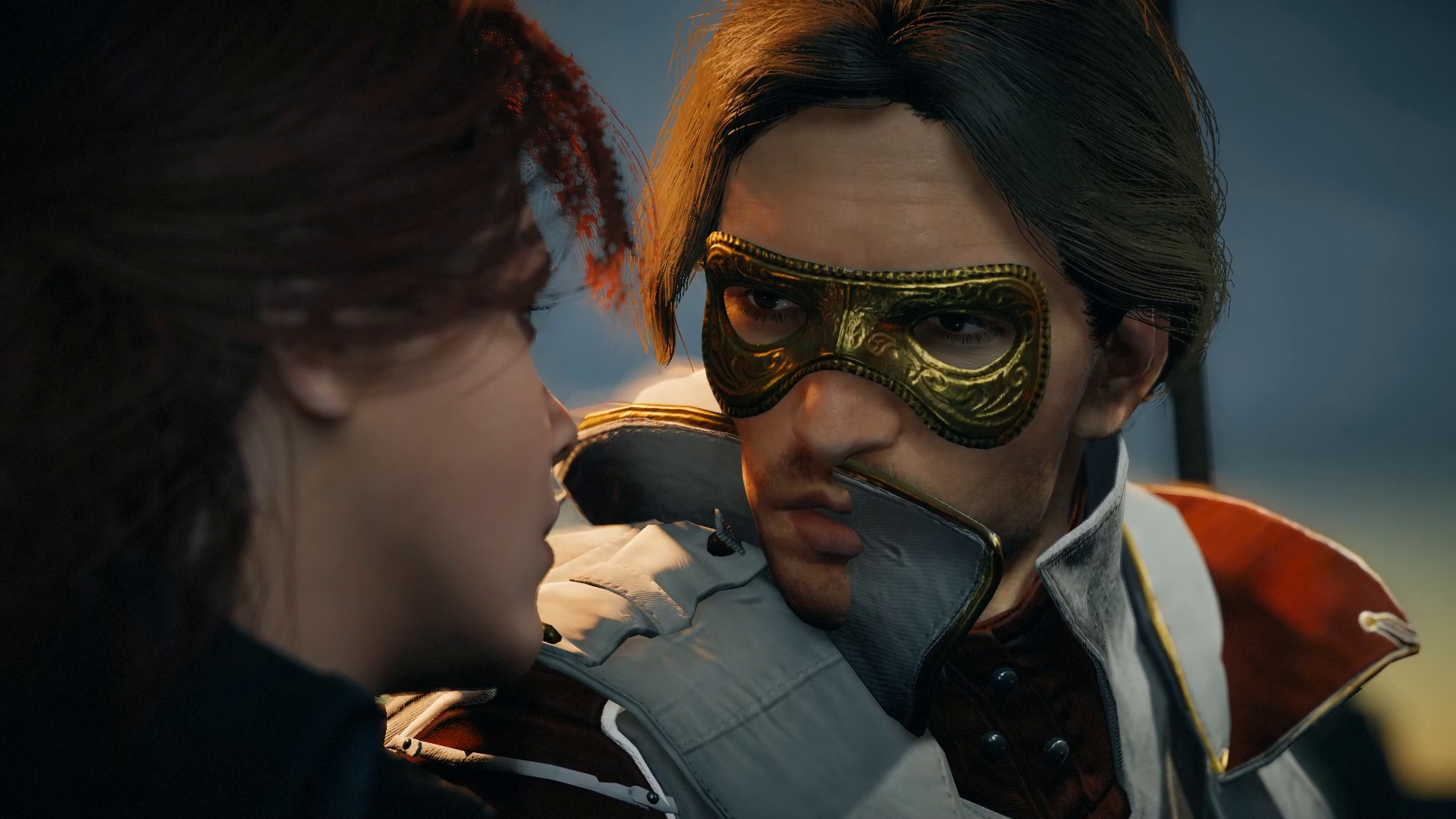
Almost a tender scene, ruined by silly outfits, bad accents and clipping.
The "story", as it is, consists of Arno tracking down, one after the other, a sequence of people in the Templar order responsible for the death of his father figure. The standard formula to these encounters is two or three run-up missions per sequence, closing with a grand, open-ended assassination mission in a large area. The formula would be a lot more compelling if the target were actually important to me, the player. In many cases, I'm not even sure that they're that important to Arno, who may not even speak their name in the run-up missions but needs to kill them because they are a link in the chain. As such, the challenge in these missions is interesting - encouraging thoughtful, adaptable approaches to dealing with targets - but the motivation is non-existent. Furthermore, when this is the central plot, it's really not that compelling. There is a wider story with Arno and Elise, and arguably one with Arno and the Assassins, but really there is very little tying the missions and sequences together.
Unity's attempt at moralising and exposing grey areas is, if you'll pardon me, just a little too far up its own arse. It poses grand questions about the morality of either side: Assassins and Templars, are they so different? Do their goals align? Have the Assassins diverged too far from their original path? All valid questions, all interesting and worth exploring. But Unity doesn't really bother, merely teasing the ideas and ignoring them forthwith. This wouldn't be quite as galling if I didn't already know that the next game, Syndicate, would do away with all this theorising and return to the classic moustache-twirling villain formula which built the franchise. I suppose I just don't like a game, or any other media, to plant an idea in my head with no payoff or further exploration - it feels lazy and non-committal. But I digress; we were talking about story.
Unlike Connor in Assassin's Creed III, who feels like a driving force in every revolutionary battle in the American War for Independence, Arno feels much more like he just lives in the time and place. In one way I think that's how it should be: he is periphery, dipping into situations in which he's become embroiled but not actually being an instigator of the major beats of the revolution. On the other hand, this doesn't quite track with either the Assassin or Templar mandate: the Templars deliberately started this revolution (as led into by Assassin's Creed: Rogue) and it should be the role of the Assassins to stop it, but they really don't seem to be butting heads at all throughout the mess that develops, instead being fixated on in-fighting. It's odd for them to be both so involved and not involved at all, but perhaps I'm just expecting that the protagonist would be at the centre of the Assassin vs Templar conflict, which may just not be the case for Arno.
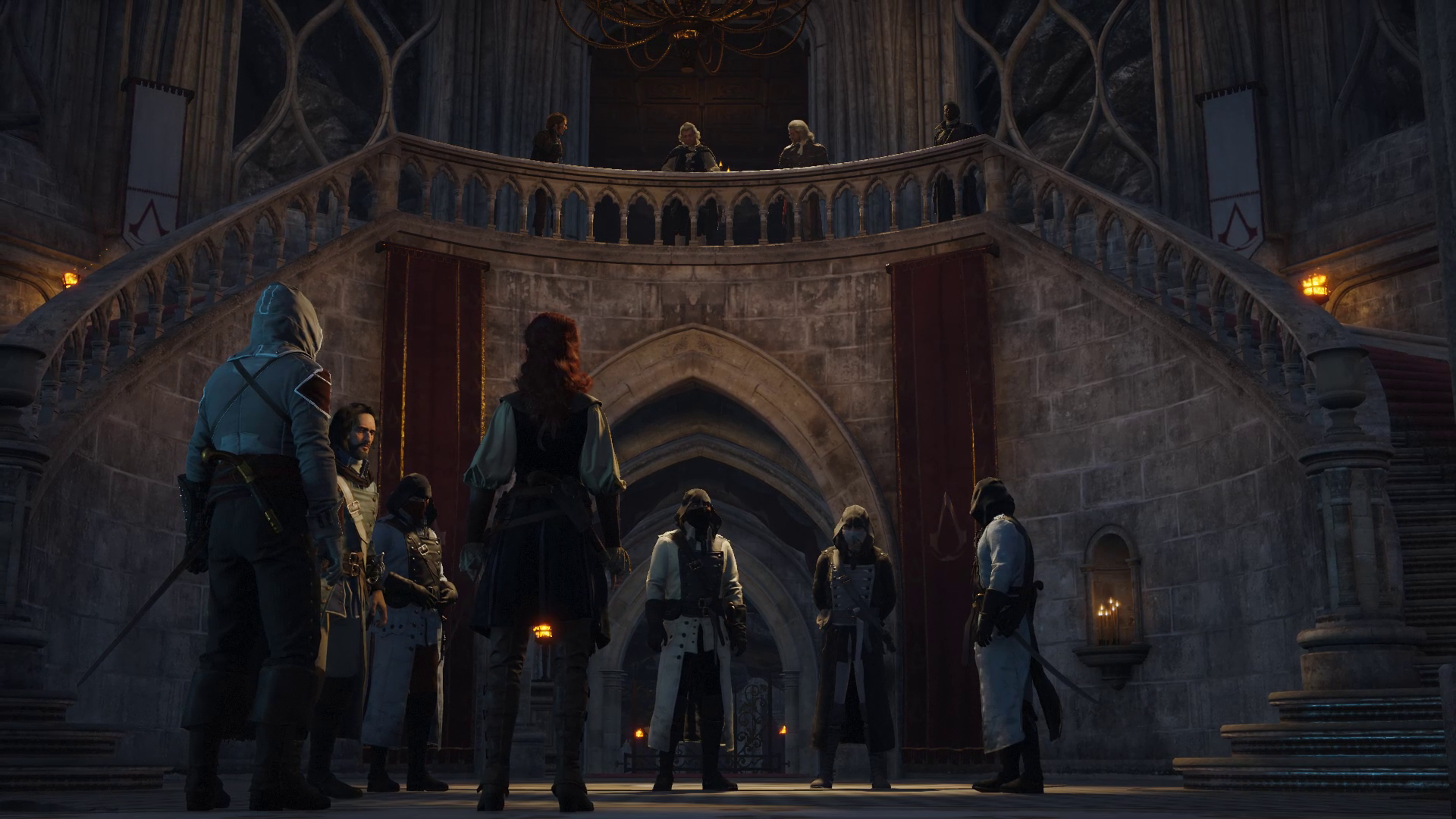
The conflict had notes of depth and intrigue, but never felt fully explored - possibly due to Arno's complete disinterest in it.
Regardless, the revolution is an interesting backdrop for the game. It allows for the Paris Stories to exist, a collection of story driven sidequests built around figures and events - fact and fiction - of Revolutionary France. The stories themselves are indeed interesting, with characters like Madame Tussuad and a Scarlet Pimpernel ripoff, exposing little snippets of life during the revolution. Unfortunately, the gameplay is incredibly boring. The majority of these stories are painfully slow escort missions, basic assassination missions, kill x enemies in area missions, and flavoured combinations of all three. The framing and characters do not save the slow, repetitive style of gameplay that we've seen millions of times in Assassin's Creed games before. It's very disappointing for such potential to be stripped away by an innate lack of creativity which is pervasive throughout the game's gameplay. Madame Tussaud has a quest for us: kill some people. It's a phone-in performance built for filler content.
There are a couple of enjoyable filler pieces though: the Nostradamus Enigmas and the murder mysteries, though the latter only up to a point. The Nostradamus Enigmas are in later cases challenging, requiring you to follow clues to identify a string of symbols located around Paris, with the locations described in often very tricky riddles. The challenge was meaningful though, and every time I eventually found an answer that was giving me grief it made sense in the end - the riddle was sensible, if difficult to initially tease out. Not so much the murder mysteries, which require a series of clue finding and witness questioning to identify a murderer. Initially they were very satisfying, but the later ones became tedious, with the many clue locations giving me the run around and the culprit never really being clear cut. In many of the later stage cases, it feels like the murderer could be anyone, and just happens to be the one the game dictates, with the evidence not really giving a strong indication of why it was the butcher and not the baker.
One of the biggest, most exciting changes marketed for Assassin's Creed: Unity was a revamped navigation and climbing system. The premise is that freerunning is now controlled by holding down buttons which will guide Arno up or down as required, making it easy to plan out and switch between routes on the fly. It's a shame it doesn't work properly. There is so little difference between parkouring up and down, with the exception of dealing with vertical surfaces, that it's hard to picture exactly what boundaries the developers mapped out. In fact, I have taken to describing them differently: parkour-reckless and parkour-cautious, respectively. When told to parkour up, Arno is happy to leap into the void with little chance of anything to grab onto, and parkour down will only ever work when the stars are perfectly aligned for a gentle descent, otherwise Arno will baulk at the edge of the building/wall/box he is perched on and flail his arms around. It's clunky and frustrating and just feels like it doesn't work. And why oh why was it deemed a good decision to map leaps of faith to both parkour up and down? It makes gentle descents or further climbs from high edges impossible. The number of times I have tried to leap across the street during a rooftop pursuit and instead ended up in a haystack four floors down was ridiculously high, and seems to me to be exactly the kind of occurrence the new system was designed to eliminate.
A point in its favour: Unity fully supports PS4 controllers on PC as default, with no third party software required. I noticed this as my plugged in controller - which I mostly use for games involving flying - lit up as soon as I started the game. After so many navigation frustrations using a mouse and keyboard, I decided to give the controller a go. It was notably better, which only served to frustrate me further: it was evidence that the developers had not taken the time to ensure that their game was fully functional on PC, which is unacceptable, and in fact shows in the frame rate too (which, on my PC, was rarely above 45 - compared with Syndicate averaging 60 and Origins and Odyssey sitting at about 50-55). Even with the controller, navigation isn't really fixed, with some jumps only being possible on the second attempt, some instructions simply not being adhered to and multiple, audible exclamations of, "Why on earth would you do that??" from yours truly. Navigation in this game was sold as a smooth, intuitive experience, but in truth it is clumsy, frustrating and feels incomplete. As the arguable centre piece of any Assassin's Creed game, it's a huge blow to the game's playability and enjoyability.
If generally getting around wasn't bad enough, Arno just doesn't feel quick. Getting him moving feels really slow, with each action carrying a laboured, sticky feel. It looks good, with the animations blending perfectly in a realistic, human way, but as well realised as it is it still takes the fun out of playing. Moving in and out of cover is particularly bad, with half a second of dead time as he thinks about moving in or out of hiding - an eternity if you are being spotted by an enemy or missing a perfect assassination opportunity. Going from stationary to walking feels like Arno is making an uphill start, and hopping from one piece of rooftop to a slightly lower piece of rooftop often feels like wading through honey. It's accentuated by some jumps just not appearing to be possible: this is forgivable when it's across a wide gap, but from a waist-high cart to the floor? From the ground to a platform barely two feet high? From a crate that Arno has decided to mount to the cobbled street it's sitting on? Arno often takes a lot of convincing and corralling to make these exceptionally tricky movements.
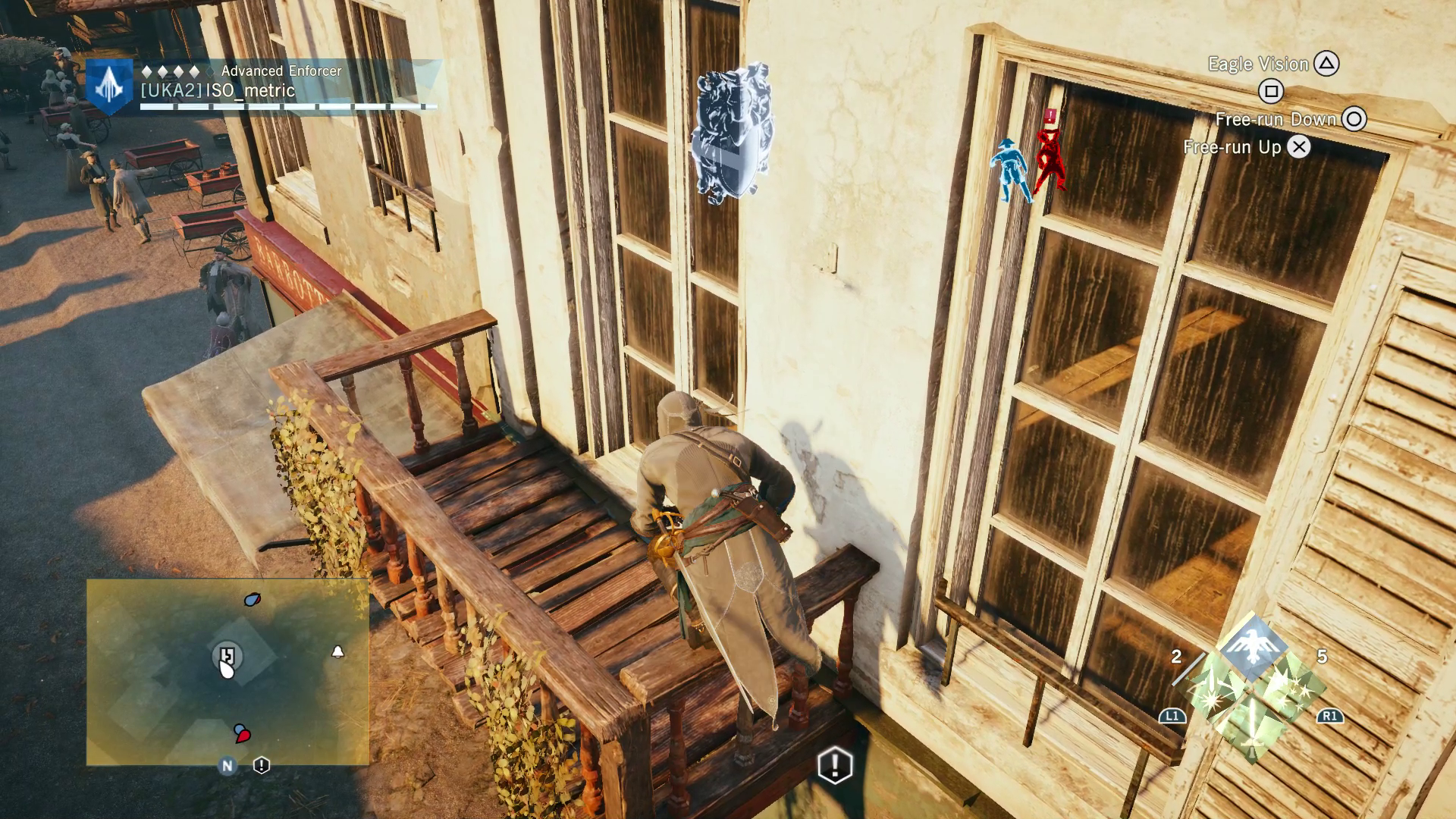
This kind of ledge proves to be pretty tricky for Arno to be coaxed off of.
The combat system in Unity promises a lot, and does appear to be made interesting and varied by the many different weapons made available by the new gear system. However, after a few hours of playing, it becomes clear that there's a very simple, repetitive formula to every encounter: break defense, attack, repeat. Breaking a defense can simply be a well timed hit with some of the more grunty enemies, but may require a special attack on some of the tougher ones. Parrying well also usually breaks a defense. After breaking a defense and getting a hit in, you have two more good hits before the enemy automatically recuperates, regardless of the weapon being used (though quicker weapons let you get the three hits in quicker). The animations are generally masterfully crafted, looking fluid, streamlined and exceptionally well strung together. Usually I'd forgive boring combat if it looked good and was generally an inoffensive means to an end, but unfortunately Unity doesn't get a pass because it is so breathtakingly, fist-clenchinlgy, eye-roll inducingly frustrating.
There are a few things which Unity combat does that really get on my nerves. First of all, the flashing warnings of incoming enemy attacks are not visible if the attack is coming from off-screen. It could be argued that this is by design, to make the combat more challenging (one of Unity's pre-release promises), which I would concede if the camera was any bloody good. It rolls and pitches with a mind of its own, snapping and swinging around, making any reasonable tracking of enemy movements entirely impossible. The problem is particularly bad indoors, where the camera struggles to keep track of Arno, let alone the people he's fighting. Too often have I run into a house and been chopped down in a flurry blades that I couldn't even see, because the camera had decided I'd much rather get a closeup of the floorboards.
Arno also sometimes just forgets he's in combat, sheathing his weapon and strolling around with the sluggishness previously described - worse still, the dodge button in combat is the cover button outside combat, so attempting to dodge when Arno has forgotten he is surrounded by enemies results in the painfully slow process of gluing himself to the wall and detaching again before he can do anything about the storm of attacks.
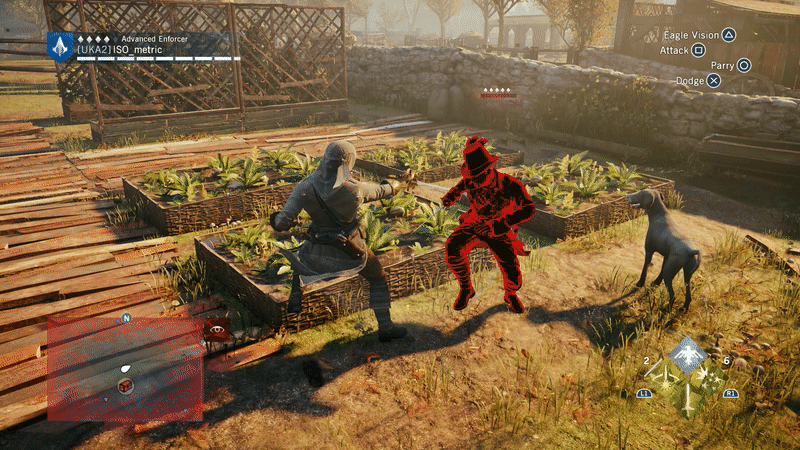
This gif captures a moment when Arno decided that - just for a second - he was just done with the fight, thank you very much.
The enemy attacks are their own kind of frustrating too, even when you can see them. Guns are very common, sometimes indicating when they are about to fire and sometimes not, which is an awful lot of fun. Guns have been around in Assassin's Creed for a while, but we've also previously had an option to use enemies as shields; this is done away with in Unity for no comprehensible reason. Not to worry though, you still have three options for avoiding gunfire. Number one is to attack the shooter, which is very difficult when they're one of the annoyingly lethal sharpshooters on faraway rooftops. Number two is to dodge, which you can only do if you're still in combat and have line of sight of the shooter. Number three is the break line of sight. None of these really happen nice and smoothly in combat at all (like a human shield would), so guns have become one of the most frustrating things in the game - and possibly the worst part is that gunfire is not queued up like physical attacks are: if they decide to, any number of enemies could shoot at you all at once. So if three of them make that decision? Tough, your health drops from max to zero before you even realised they were aiming.
Unity combat also introduced finishers, which are an extra hit you can perform on an already-defeated enemy for Creed points. I can't stand them. They queue up an overlong, brutal animation which adds nothing at all to gameplay. It would be understandable - and possibly even enjoyable - if it only applied to the last enemy in combat, giving the fight an exciting closing flourish. But Arno seems determined to perform a finisher on every single enemy, even when actual threats are queueing up out the door. This is most frustrating when you've just landed a perfect parry and opened an enemy up to a string of attacks, but Arno squanders this opportunity to repeatedly stab someone who (for all intents and purposes) is already out of the game. It slows the combat down, gives enemies a chance to regroup and further confuses the camera, which feels the need to zoom in for a better look and can never quite zoom back out quick enough.

The classic, recurring story: beat a mob, go in for the finisher, camera decides to rest for a bit, stabbed by the next mob
In an effort to give Unity the best possible chance at impressing me, of extracting a sliver of light from the quagmire of frustrating mediocrity, as previously mentioned I vowed that I would 100% complete it, as well as The Dead Kings DLC. That means every mission completed to the optional specifications, every animus fragment collected and every chest opened. It was a painful slog.
This is probably a good time to mention the longevity of games like this. Unity launched with a companion app, which included in incredibly useful live map and gear customiser, but also plenty of bloat missions. These were timed tasks, the longest of which lasted 48 hours from memory, which you assigned to assassins in your mobile, make-believe brotherhood. There was a chance of success, increased by how much you had previously upgraded your assassins by pure grind, which would reveal a chest in-game with some decent loot. At the time, Ubisoft were also trying desperately to make Assassin's Creed: Initiates a thing: an online portal through which daily tasks would unlock more in-game content. Both of these means of unlocking unique rewards are now defunct, but thankfully Unity has done the decent thing and made them all available by default, meaning the game is not limited for new players. It still feels empty though, and hopefully lessons have been learned about the reliance on volatile platforms.
The co-op missions, however, have not changed, despite no one at all being online. I tried to get an online player for every single one, and succeeded twice (out of roughly 20 times). To unlock all rewards, each one must be played three times, a real chore if you are on your own. They are not so much challenging as simply having been designed for multiple players, which I was just not able to achieve. The worst of the pack is a tournament mission, which requires Arno to collect a number of flags around a timed assault course. Coupled with Arno's highly unpredictable and imprecise movement and the obvious design for more than one player, this task is incredibly difficult and highly frustrating. I ran out of time to complete the objective almost a dozen times, and never once did I feel that it was my fault or understand why things had gone wrong. It was always down to Arno leaping down instead of up, or missing a ladder I was pointing him to, or simply getting stuck on a low wall.
I suppose I should also speak about the Dead Kings DLC. If you enjoyed Unity, Dead Kings is much of the same. Arno is a little more grizzled and disillusioned, but his character interactions are so limited that it makes little difference. The story is pretty sparse and the side quests are nothing to write home about. There are three major gameplay additions: the guillotine gun, raider leaders and the catacombs. The guillotine gun is a new weapon type which acts as a heavy weapon except that it also allows you to fire a disappointingly ineffective mortar bomb into groups of enemies. This rarely kills groups of more than three outright, and is particularly pointless when about half of the optional objectives of Dead Kings quests are to "stay out of combat". Raider leaders are evidence of the early DNA of the fear mechanic which made Syndicate's Jack the Ripper DLC interesting: killing a raider leader will panic other raiders, making them flee. The catacombs are just a linear area accessible through various means of descent in Franciade, and are a slightly boring additional play area with a few neat platforming puzzles. Dead Kings also introduced Templar base objectives which you can oust but gameplay these are so unoriginal (kill three captains in a restricted area then escape) that they are barely worth mentioning.

Assassin's Creed Unity - Dead Kings. The same, but with a lamp.
In short, Assassin's Creed: Unity looks gorgeous, with wonderfully built setpieces and exceptional animations and models - ahead of their time - marred by poorly integrated new features and unimaginative old ones, blandly flavoured by a weak cast of characters and a not particularly engaging story. It feels squandered: the introduction of an expansive gear system and many other interesting facets failed to save the game from its poor core implementation and functionally incomplete state. It's a real shame. The skeleton of an amazing Assassin's Creed game exists but the connective tissue is weak, making it unable to stand on its own.